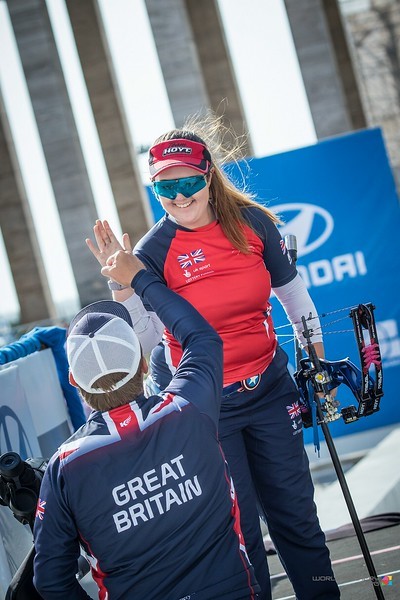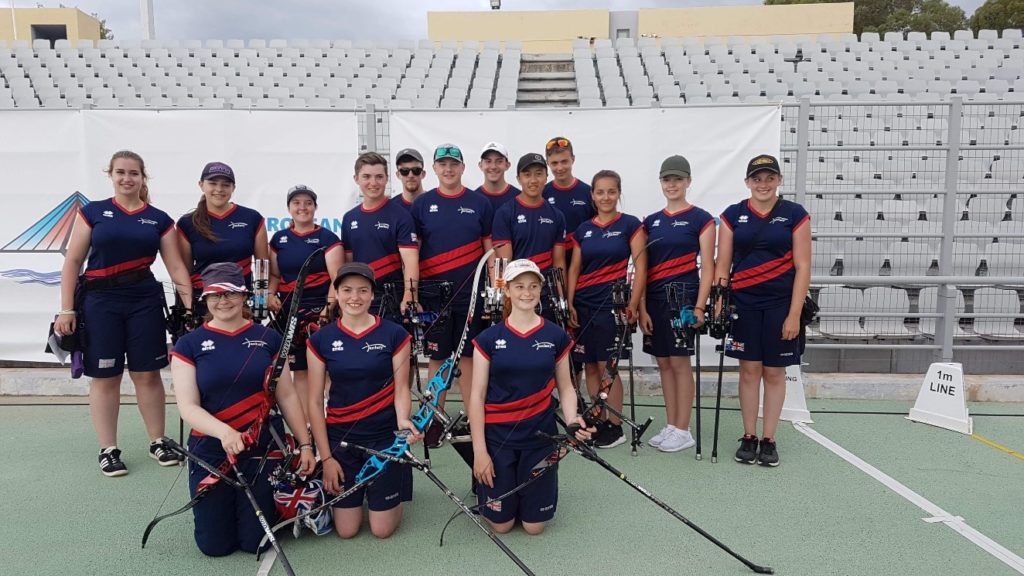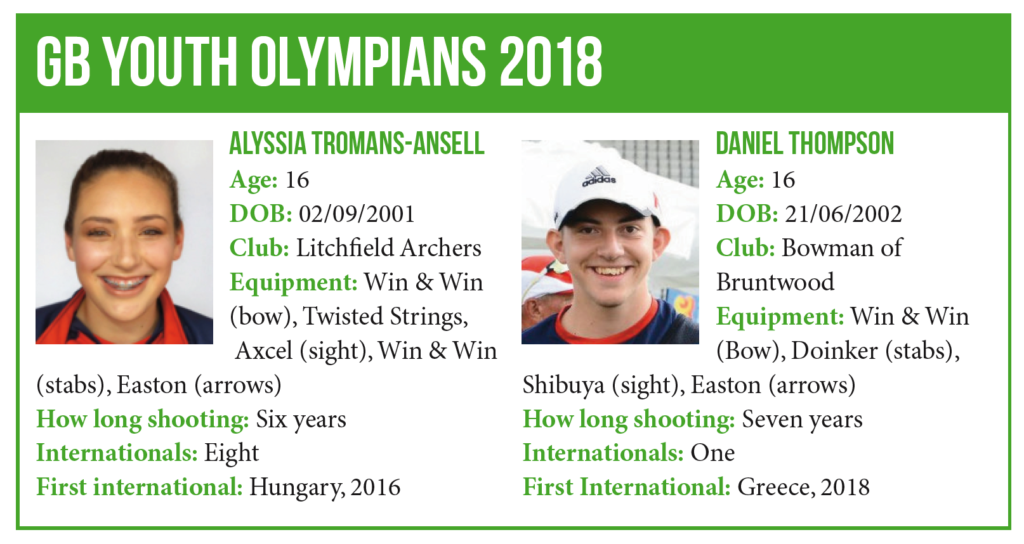Great Britain’s youth team are conquering the world. By Izzy Carpenter.
In the years since London 2012, there has been a sea change in British international archery. Many of the senior internationals that appeared for GBR at the London Games and in the era preceding have now retired or moved onto other roles in the sport.
While the para side of the sport, separately funded and staffed, achieved spectacular success in Rio, the international performance side of Archery GB saw a period of some turmoil over staff and funding. But there is a great deal to look forward to, with a youth team of serious quality now moving into the international scene – both compound and recurve. And next month, GBR will send two recurve athletes to the Youth Olympic Games in Buenos Aires, with both spots hard-won in international competition. The turning point for GBR came at the World Youth Championships in Argentina, at the beginning of 2017. Archery GB’s Performance Team had a goal of five medals: three for compound and two for recurve.
The group of young athletes who would be competing out there had won their places on qualifying scores and a selection shoot prior to the event. The selection shoot consists of a WA720 qualification round and individual round robins with one arrow shoot offs. Once achieving a team spot, the archers had less than three months to prepare for the biggest event of their careers so far.
I spoke to some of my teammates who succeeded at the World Championships to tell me what they did to get themselves prepared: “Lots and lots of training,” Sarah Moon, the three time medal winner at the Worlds, told me. “I did gym work, I shot every day, I did lots of mental preparation, I learnt about my kit; I kind of prepared for any scenario I would possibly be met with.”
Everyone expects to hear that physical training and strength work is necessary to winning, but how many people look over the importance of training the mind as well? Archery is often described as more mental than physical, and the mind, like any other muscle in the body, can be strengthened; it is simply a case of telling it what you want to happen.
One person who very much believes in the importance of mental training is Lucy Mason, the compound cadet women’s World Champion.
“In my opinion,” said Lucy, “the most important part of your mental game is accepting bad arrows. The best thing to do is mentally re-set and focus on getting the next arrow in the ten. I like to call this ‘damage control’.”
All of the athletes who were successful in winning medals out in Argentina mentioned mental work when I asked about their pre-competition preparations. Some argue it was the work on the mental side that made the real difference. Simon Scott, the GB youth team coach is one of these people. I asked him about the Youth Team’s progression and what he believed this was down to, he said, “Belief. It’s easy to get into the habit of winning – you just need to start winning! Over the past five years, the existing athletes have upped their game to become more competitive and created the winning habit.”
Jon Nott, the AGB compound manager and Events and Facilities Manager, also agreed with his fellow coach adding, “The team needed a generation of shooters who wanted to be better, who wanted to be winners and who did not just want to make up the numbers.”
As a result of perseverance, dedication and new-found mental confidence, as a team we came home with five medals in total. Overall, Great Britain placed high in the medal standings, finally finishing joint 4th with Chinese Taipei.
Less than a year after the record winning amount of medals achieved at a World Youth Championships by any previous GB Youth Team were won, the archers continued their winning streak going forward into the European Youth Championships at the end of June in Patras, Greece. Some of the athletes had already shot together in teams of three, while for others it was their very first international.
Jenny Bryan was one of these archers, and she came home with two medals, both silvers. “It was really good, it was an eye opener.” Jenny told me. “And the whole team, even though I didn’t know many people on it, it really felt like a proper family.”
Nearly all of the new team members credit the dynamics that hold together Team GB. There is the obvious importance of shooting well as an individual, but some don’t realise that an archer also has to be able to adapt and shoot well with others, too.
I spoke to Luke Ralls, a compound archer who has just moved up from the juniors into the seniors having competed on the Youth Team for five years, about the significance of team bonding: “I believe that for a world class team they need to shoot well as an individual.
The three teammates also need to work well off the field as well as on, and be friends and understand what each other needs.”
Being close with your teammates means being able to understand them as an archer, but it also means to be there if they need you. For Kai Thomas-Prause, he had a teammate that supported him when he needed it most:
“When my release broke in the first end of the individual matches,” Kai told me. “I was even more nervous and anxious using another teammate’s release but now I realise that was a perfect test for how all the mental work had helped me.”
But what happens if you end up facing off against your own teammate? Compound cadet women, Layla Annison and Jenny Bryan both fought their way to the gold medal match, where they would end up meeting each other.
“It’s not a great feeling,” Layla expressed. “But at the end of the day you’re there to shoot well and if it comes to shooting against your teammate, you know one has to be the victor.” “I was actually really excited about it because I knew it would’ve meant more.” Jenny added. “It was a big deal for me anyway, and coming back with a medal is fantastic.”
Two to three coaches for compound and for recurve attend the internationals with the athletes alongside the team manager and a chaperone. “Both coach and athlete should have mutual respect for each other.” Jon Nott said. “The athlete must believe in the coach and the coach should also believe they can make a difference for that athlete.”
“In the fifteen minutes that you’re on the finals field with an athlete or a team, good interaction is crucial.” Simon stated. “The mind-set is created on the field beforehand, making sure that we are both in a good place, confident, having fun, and trust that whatever happens, we’ll still be alive at the end.”
Team GB’s connection, confidence and commitment, to their goals and to each other, produced an astounding haul of ten medals including four golds. As a team, Great Britain continued the ascent up the standings and finished in 2nd place behind Turkey.
The young archers on the Great Britain team are not only making their mark in the youth internationals, but are also on the scene now at senior internationals. Alex Wise, a recurve archer who is currently still a junior is one of these archers who has been able to compete with the senior GB Team. I asked Alex about the differences between senior and junior trips, and also what it is like to be a youth archer among the world’s best.
“There’s the obvious fact of the level of skill shown at each one,” Alex said. “The senior events are at a much more consistent high standard than the junior ones which makes them much more challenging.”
Alex got his first taste of senior international experience this year at the Antalya World Cup, where along with Tom Hall and more experienced international Patrick Huston they took a bronze medal in the men’s team competition against Malaysia.
At this year’s Berlin World Cup, the youthful team of Eleanor Piper, Bryony Pitman, and Sarah Bettles, with a collective age of just 65, managed to beat hosts Germany and world no. 2’s Chinese Taipei on their way to a final against Korea, and a well earned silver medal.
Midway through an Olympic cycle, and with senior and junior World Championships next year, the future for GBR archery is looking bright.






[…] then went on to have a go at interview pieces for Bow International magazine which I really enjoyed doing. Recently, I have done various pieces for Archery GB about […]